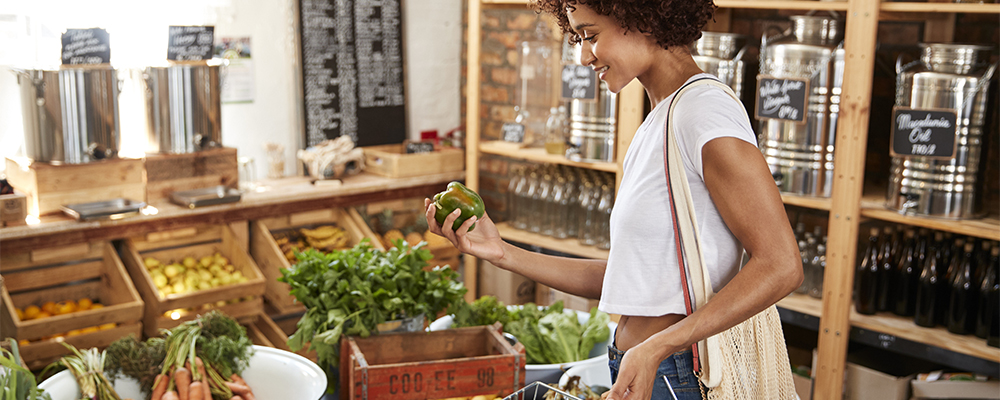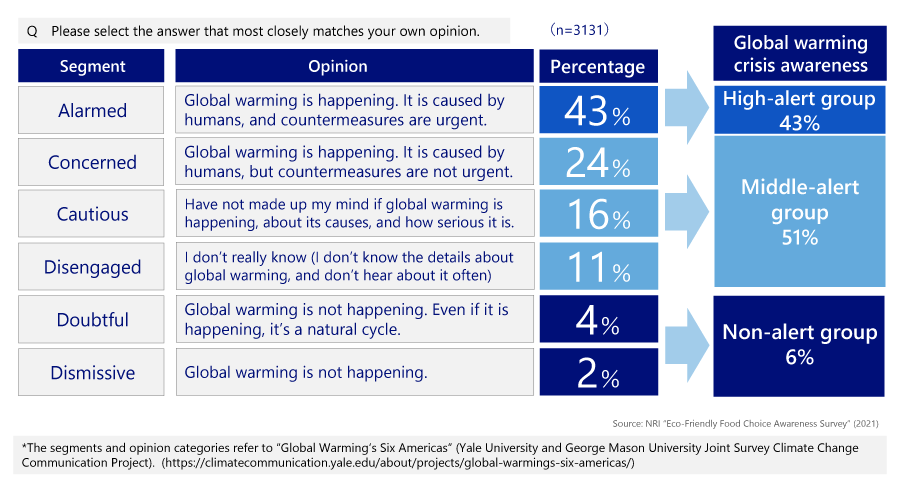
Will Global Warming Crisis Awareness Increase Eco-Friendly Food Needs?
From August 6 to 9, 2021, Nomura Research Institute (NRI) conducted an Internet questionnaire of 3,131 individuals ranging in age from their 20s to their 60s in all 47 prefectures nationwide regarding their awareness of choice with respect to “eco-friendly foods” that contribute to global warming prevention.
We interviewed Noriko Sano of NRI, who conducted the survey, about the relationship between the awareness of global warming as a crisis and the awareness of eco-friendly food choices, issues that emerged from the survey, and the efforts needed from food business operators.
More than 40% of high-alert respondents think that global warming is critical and countermeasures are “urgent”
On August 9, 2021, the IPCC (Intergovernmental Panel on Climate Change), a UN expert meeting, said that humans are the cause of global warming, and by 2040 the temperature is very likely to rise by 1.5 degrees Celsius compared to before the Industrial Revolution. If the temperature rises by 1.5 degrees Celsius, 10-year heavy rainfall events will occur 1.5 times more frequently, and abnormal temperatures will occur 4.1 times more frequently. It predicted that if worldwide carbon dioxide emissions were limited to 500 billion tons after the beginning of 2020, there would be a 50% chance that the temperature increase would be kept to 1.5 degrees Celsius, suggesting that countermeasures are urgent. Today, the world’s carbon dioxide emissions are about 40 billion tons per year, which means they will reach 500 billion tons in the next 12 years.
Meanwhile, what about the Japanese people’s awareness of the global warming crisis? In an NRI survey conducted around the same time, we asked consumers what they thought about global warming, and classified them into three groups.
There is the “high-alert group” (43%), which thinks that global warming is critical, humans are the cause of global warming, and countermeasures are urgent; the “non-alert group” (6%), which thinks that global warming is not happening, or that even if it is, it is a natural cycle, and the “middle-alert group” (51%) in between.

60% of people want to choose “eco-friendly foods”, but don't know which are eco-friendly
Food purchases are a frequent activity for many consumers. In the survey, those who wanted to choose eco-friendly foods that contribute to global warming prevention accounted for 60% of all respondents. This was about 10% in the non-alert group, 50% in the middle-alert group, and just under 80% in the high-alert group. Increasing awareness of global warming as a crisis will presumably lead to increased awareness of eco-friendly food choices.
However, in the survey, more than 70% answered that “there is no information to tell which foods are eco-friendly”, and those who do not wish to choose eco-friendly food cited as their primary reason that “I do not know if it is really eco-friendly food” (45%). Also, even among respondents interested in specialty stores that carry eco-friendly foods, just under 30% answered, “I do not want higher prices”, while one in two interested people answered that they would tolerate it if the price were “only about 10% higher.”
We can see that skepticism about foods claiming to be eco-friendly, the lack of information to determine whether something is an eco-friendly food, and high prices are the bottlenecks in choosing eco-friendly foods.
Respondents bothered by plastic containers and packaging and want to prioritize “foods that use containers and packaging made of natural materials”
The most common answer as to what kind of eco-friendly foods people want to prioritize choosing was “foods that use containers and packaging made of natural materials.” 60% of all respondents answered that it was a high priority, and in the high-alert group this answer climbed to just under 80%. The survey also found that, when asked about what bothers them when buying food, one in three people cite the fact that “there is a lot of plastic in containers and packaging”.
In addition, one in two people responded that they would like to prioritize “agricultural products using biochar”, which absorbs carbon dioxide into agricultural land, and one in two people also said that they were interested in “organic foods” that contribute to global warming prevention.
A system needs to be created to make it easy to choose eco-friendly foods
Going forward, a system needs to be created to make it easy for the many consumers who want to choose eco-friendly foods to do so.
The most important thing is to answer the question, “Is it really eco-friendly food?”
The results of the survey show that respondents want to prioritize, or are highly interested in prioritizing, choosing any foods whose “production methods” (e.g. farming methods), “ingredients”, “electricity consumption”, “containers or packaging” have been revised, or for which efforts have been made with respect to “greenhouse gas absorption.” In particular, it can be said that food products with revised containers, packaging, and ingredients make it easier for consumers to concretely understand their contribution to global warming prevention.
In doing so, permissible food prices differ depending on the consumer group and food brand, so it is necessary to set “target prices” case-by-case and leverage IT (digital technology) and collaboration to ensure efficiency improvements in the course of production, processing, distribution, and sales to suppress price increases. At the same time, it is necessary to approach “target prices” by devising ways to increase added value and unit prices for food through switching to processed products and branding.
Consumers also find it important to be able to easily select eco-friendly foods that have successfully implemented these kinds of global warming prevention efforts. According to the survey, one in two people answered that they want to check an eco-label (58%), are interested in specialty stores that carry eco-friendly foods (56%), and would switch to choosing eco-friendly food if they receive reward points (58%). It is necessary to take a multifaceted approach and create a system that makes it easy to choose eco-friendly foods.
The growing awareness of global warming as a crisis has created a consumer group called the high-alert group who recognize the value of “contributing to global warming prevention.” Among the middle-alert group, there is a concerned segment that recognizes global warming but thinks that countermeasures are “not urgent”, and when combined with the high-alert group, it amounts to just under 70%.
Going forward, efforts for global warming prevention that many consumers can contribute to in their day-to-day lives will become even more important.
Profile
-
Noriko Sano
* Organization names and job titles may differ from the current version.